The Rise of Online Coaching
The internet has done something interesting to coaching. What used to be a one-on-one conversation between coach and client has turned into something much bigger—and more scalable. Today, coaching happens in live sessions, group webinars, and digital courses. And all of this happens on online coaching platforms.
Now, if you’re running a coaching business, or thinking about starting one, the platform you choose matters a lot. Not just because it will handle things like payments and course delivery, but because it will define the kind of experience you give your clients. And in an industry that’s growing fast, competition is fierce. The wrong platform could leave you behind. The right one? It could set you apart.
But how do you pick the right one? That’s what this article is about. We’ll review five of the best online coaching platforms out there. And we’ll look at how you, as an entrepreneur, can build something even better by using Scrile Meet
as a base. Because let’s be honest: the best platform for online coaching doesn’t just exist—it’s built.
Why Online Coaching Platforms Matter
The world of coaching isn’t just about giving advice anymore. It’s about creating experiences. These experiences—whether they’re one-on-one sessions or group courses—need the right platform to thrive. The best online coaching platforms don’t just organize your content; they elevate it. They streamline everything from client management to delivering content, so you can focus on what you do best: coaching.
The right platform makes running your coaching business easier. It handles payments, scheduling, and client communication, which means fewer headaches for you. But more than that, a good platform can help you scale. It can let you take what you offer—whether that’s life coaching, fitness training, or even adult content creation—and make it available to a larger audience.
For many coaches, community-building is a big part of the business. Online coaching platforms like Mighty Networks thrive on this. They don’t just allow for one-on-one sessions; they encourage group interaction, turning your clients into a supportive network for each other. This kind of community-building can be the difference between a short-term gig and a long-lasting coaching career.
So why is scalability important? Think about this: you can only coach so many people in a day. But with the right platform, you can offer group coaching, recorded sessions, or even automated courses. This means your revenue grows without requiring more of your time.
If you’re serious about coaching, choosing the best platform for online coaching is one of the most important decisions you’ll make. You need a tool that offers flexibility, scales with your business, and makes it easy for clients to engage with your content. That’s why these platforms matter so much to your success.
Top 5 Online Coaching Platforms
When it comes to picking the best platform for online coaching, there’s no shortage of options. But not all online coaching platforms are created equal. Some offer better community tools, while others excel at course creation or live streaming. Below, we’ll dive into five of the best online coaching platforms, each with its strengths and weaknesses. Whether you’re an entrepreneur looking to build your own platform or a coach deciding where to host your services, these platforms will give you an idea of what’s possible—and what’s missing.
Mighty Networks
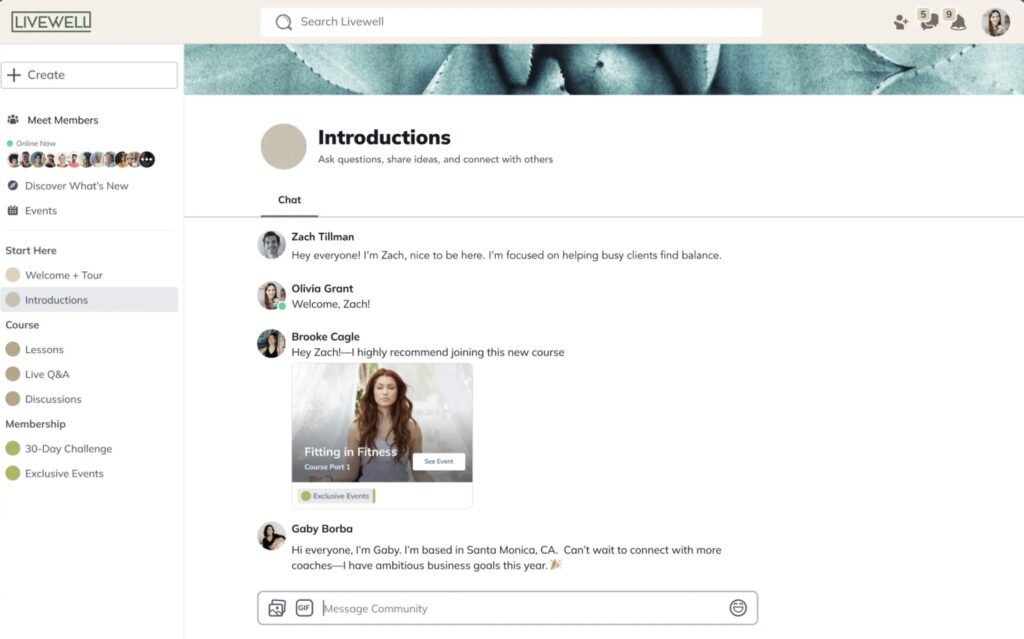
Mighty Networks stands out because it’s built around the idea of community. It’s more than just an online coaching platform for course delivery or one-on-one coaching. It encourages interaction among your clients, allowing you to build a thriving community. This is a huge advantage for coaches who want their clients to not only learn from them but from each other.
Strengths
- Community-Centric Approach
One of Mighty Networks’ key strengths is how it fosters engagement through community features. Unlike online coaching platforms that focus solely on content distribution (like Teachable or Thinkific), Mighty Networks provides tools to build interactive, niche communities. This appeals to coaches who want more than just course delivery—they want to build relationships, have ongoing conversations, and create a network effect where community members engage with each other.
The platform integrates various community tools like member profiles, activity feeds, groups, events, and more, allowing coaches to create a cohesive ecosystem for their audience. This focus makes Mighty Networks ideal for long-term engagement, which is crucial for building loyalty and sustaining membership businesses. - All-in-One Platform
Mighty Networks doesn’t just stop at community-building. It also combines courses, events, and memberships into a single platform. Coaches can create and sell online courses, host virtual events, and offer paid memberships—all within the same ecosystem. This removes the need to juggle multiple platforms for different services, making it highly convenient for both the coach and their clients. - Niche-Specific Growth
The platform is particularly strong in supporting niche communities. Mighty Networks allows creators to focus on smaller, passion-driven audiences, which may not be as easily served by broader online coaching platforms. This has led to success in niches like wellness, lifestyle coaching, professional networking, and even adult content creation. - Monetization Flexibility
Another key strength is its monetization options. Mighty Networks allows coaches to create multiple revenue streams—paid courses, monthly or annual memberships, and one-time events. This variety in monetization options allows creators to experiment and find the best strategy for their specific audience.
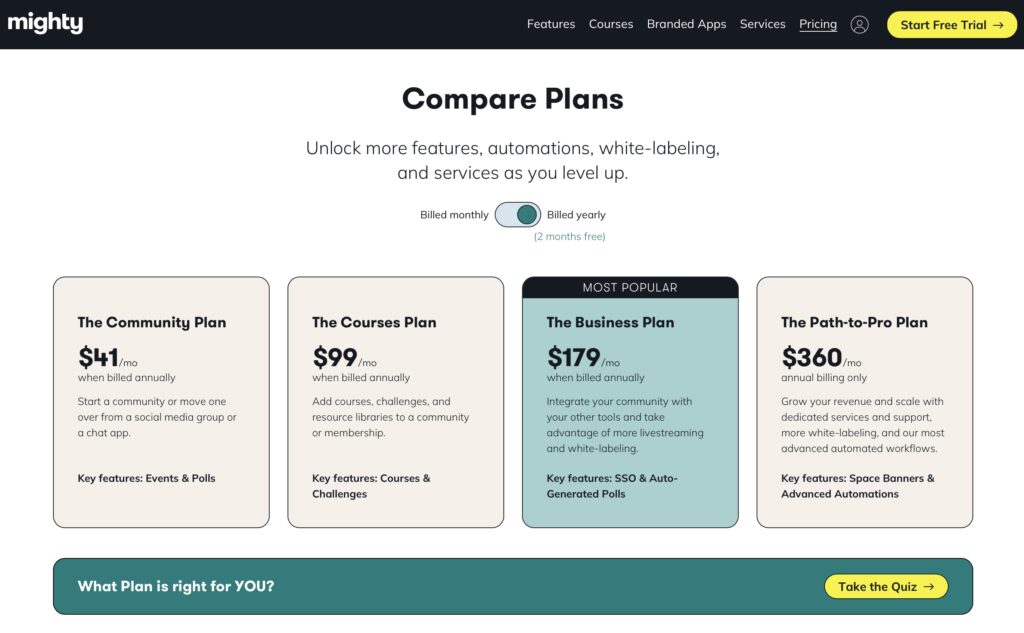
Limitations
- Video Tools and Customization
Despite its strengths, Mighty Networks has some limitations when it comes to live video. It supports live streaming, but the customization options and interactivity of the video tools are more basic compared to online coaching platforms specifically designed for live coaching like Scrile Meet or more advanced webinar tools. Coaches who rely heavily on video-based interactions may find themselves needing to use third-party services, which adds complexity to the workflow. - Lack of Deeper Customization
While Mighty Networks offers flexibility in content creation and community features, it does not provide advanced customization options for the platform’s design and functionality. For example, coaches looking to create a highly branded, unique experience might find the customization limits restrictive. Coaches who want to personalize the user journey more granularly—like custom dashboards, advanced integrations, or more control over content flows—may need to look elsewhere. - Cost for Scaling
Mighty Networks’ pricing can become a factor when scaling a community. Although the pricing is flexible, some advanced features—such as white-labeling and deeper integrations—are only available on the higher-tier plans. This can be prohibitive for creators or coaches who are just starting and want to scale their platform without paying a premium upfront.
Opportunities for Improvement
To compete with more flexible online coaching platforms like Scrile Meet, Mighty Networks could enhance:
- Live Video Customization: Expanding options for interactive video tools, allowing coaches to add more personalized experiences during live sessions.
- Deeper Platform Customization: Offering more control over design elements, user workflows, and advanced content settings would make the platform even more attractive for creators looking for a tailored experience.
- Pricing Flexibility for Beginners: Providing more affordable entry plans with access to some advanced features could help attract new users who want to grow into their businesses.
Conclusion: Great for Community, But with Limits
Mighty Networks is a powerful platform for coaches who prioritize community-building and want an all-in-one solution for content, memberships, and courses. Its niche-focused approach and monetization flexibility make it a solid choice for many creators. However, for entrepreneurs who need deep customization or advanced video features, there are gaps that can be filled by platforms like Scrile Meet, which offer more tailored options for live coaching and branding.
Teachable
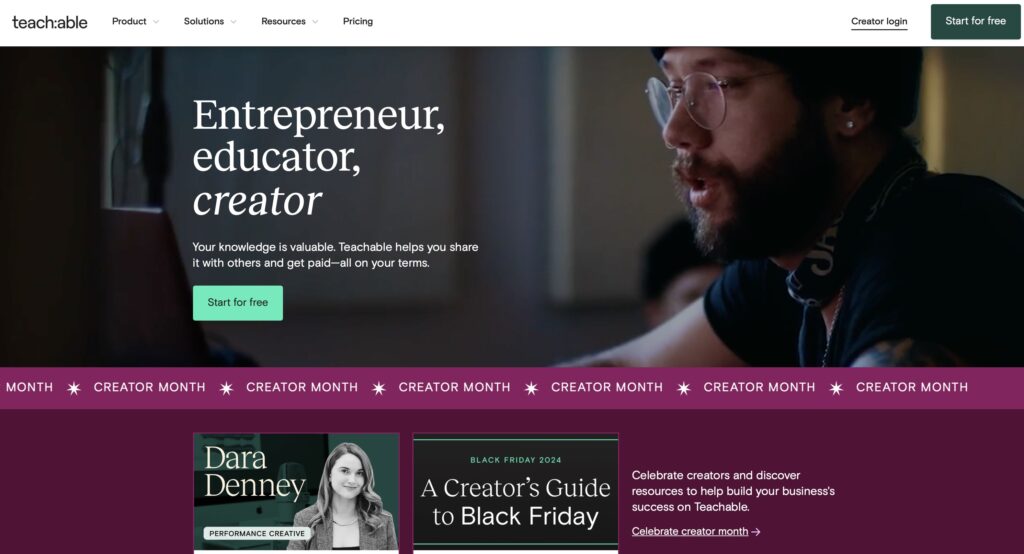
Teachable has made a name for itself as one of the leading online coaching platforms for creating and selling online courses. While it’s user-friendly and highly popular among educators, Teachable has its strengths and weaknesses that are worth examining in detail, especially for coaches and entrepreneurs looking to scale their business or tailor a unique experience. Let’s dive deeper into what makes Teachable a solid platform, where it falls short, and what opportunities exist to improve on its core offerings.
Strengths
- Ease of Use One of the standout qualities of Teachable is its user-friendly interface. It’s designed to help anyone—whether tech-savvy or not—create and sell online courses with minimal friction. You don’t need to have a coding background or design skills to launch a course. Its drag-and-drop course builder makes the process simple, and for beginner coaches, this is a significant advantage. This simplicity makes it a favorite for educators, content creators, and entrepreneurs who are just starting their journey into online coaching or teaching.
- Course Creation and Delivery Teachable excels in course creation and management. It offers a robust content hosting solution, supporting various content types such as videos, quizzes, PDFs, and other digital downloads. This diversity of content makes it easier for coaches and teachers to develop a well-rounded learning experience for their audience.
It also supports drip content—allowing course creators to release modules on a schedule, keeping learners engaged over time. This is beneficial for coaches running longer-term programs or those who want to keep their audience continuously engaged. - Monetization Options Teachable offers multiple ways to monetize courses, such as one-time purchases, subscriptions, or bundled courses. In addition, Teachable allows coaches to offer payment plans, which is useful for selling high-ticket courses and making them more accessible to a wider audience. This flexibility gives coaches and entrepreneurs many ways to experiment with pricing strategies and generate consistent revenue streams.
- Integrated Marketing and Sales Tools Another key strength of Teachable is its built-in sales and marketing features. You can create sales pages within the platform, use affiliate marketing tools, and track analytics directly, making it easier to manage both course creation and sales under one roof. For entrepreneurs who want to sell coaching courses without relying on external marketing platforms, this integration is a significant benefit.
- Scalability Teachable is designed to accommodate businesses as they grow. Whether you’re a solo entrepreneur offering a single course or scaling into a larger coaching empire with multiple offerings, Teachable offers flexible pricing plans that support your growth. Coaches can start with basic plans and scale up to higher-tier plans that include more advanced features like integrated affiliate programs, advanced reports, and priority support.
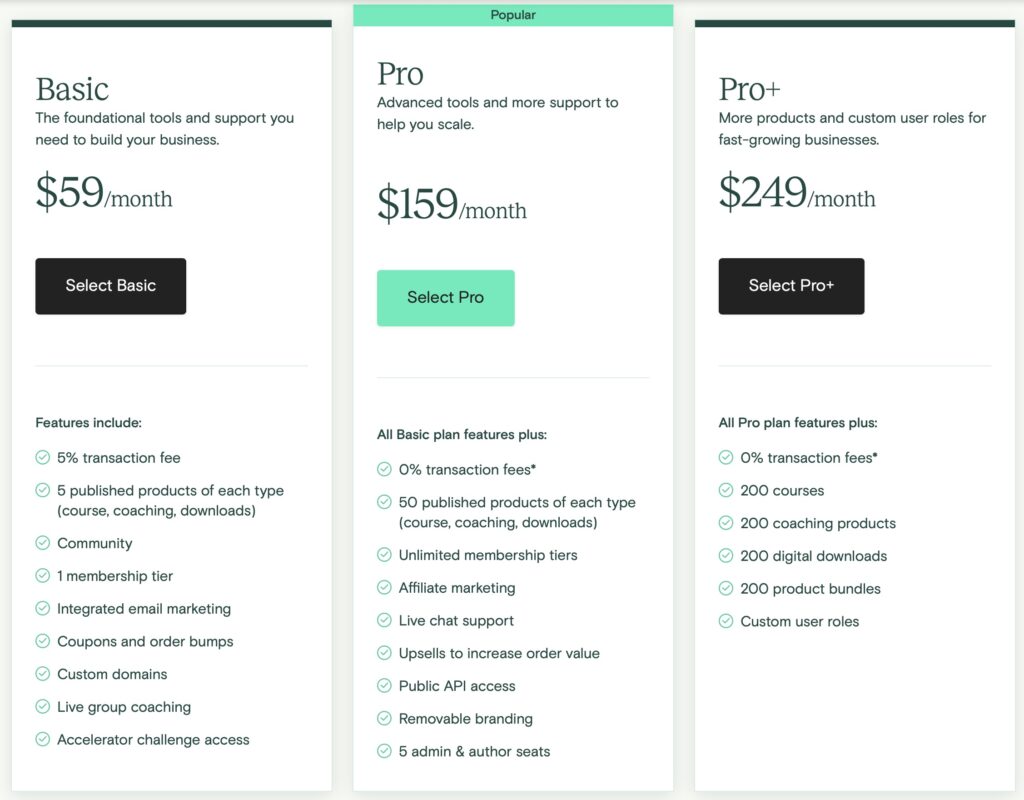
Limitations
- Limited Customization While Teachable is powerful for course creation, it’s often seen as rigid in terms of customization. The platform has a limited set of templates, and the degree to which you can tweak the design and user experience is minimal compared to online coaching platforms like Kajabi or Scrile Meet. For coaches and entrepreneurs looking to build a highly branded, unique platform, Teachable’s template constraints can be a major drawback.
If you’re looking to create a coaching platform with specific workflows or highly customized features for your audience, you might find Teachable limiting. - Lack of Focus on Community-Building Teachable’s core strength lies in course creation, but it doesn’t prioritize community-building features in the same way that online coaching platforms like Mighty Networks or Podia do. For coaches who want to build a sense of community around their courses—through forums, discussions, or group coaching—Teachable can feel lacking. While you can integrate external tools to add community features, it adds complexity and breaks the seamless experience that coaches often want to deliver.
- Limited Marketing Automation While Teachable does offer basic marketing tools, it’s not as comprehensive in this area as Kajabi, which excels with its built-in email marketing and automation features. For entrepreneurs who need advanced marketing capabilities, like sales funnels, complex email automations, or targeted upselling, Teachable might not provide enough functionality. You’ll likely need to rely on third-party email tools, which again can complicate your workflow.
- Transaction Fees on Lower Plans Teachable’s pricing structure includes transaction fees on lower-tier plans. This can be a pain point for new course creators or coaches who want to keep as much of their revenue as possible. While it may not seem significant for smaller-scale operations, these fees can add up as your business scales. To avoid these transaction fees, you’ll need to upgrade to a higher plan, which may not always be feasible for beginners.
Opportunities for Improvement
To stand out among the increasingly competitive online course platforms, Teachable could improve by:
- Introducing More Customization Options: Adding the ability for deeper customization—whether it’s design, workflows, or user interactions—would make Teachable more attractive for entrepreneurs who want to offer a unique experience.
- Enhancing Community Features: Creating more integrated tools for community-building, such as discussion forums or group coaching features, could help Teachable cater to coaches who want to foster long-term engagement with their clients.
- Improving Marketing Tools: By offering more advanced marketing automation and sales funnel tools, Teachable could compete better with all-in-one solutions like Kajabi, which allow entrepreneurs to run everything from email marketing to upselling strategies within the same platform.
Conclusion: Great for Course Creators, But Not as Customizable for Coaches
Teachable is a solid choice for online educators and coaches looking for a simple and powerful platform to create and sell courses. Its ease of use, diverse content types, and flexible pricing make it an attractive option for beginners and experienced entrepreneurs alike. However, the lack of advanced customization, community-building tools, and robust marketing automation limits its potential for coaches who want a more tailored and scalable experience.
For coaches and entrepreneurs aiming to build highly customized online coaching platforms or offer a unique client experience, Scrile Meet offers a more flexible solution, allowing deeper personalization, integrated video conferencing, and powerful community features—all without sacrificing the ease of use that Teachable is known for.
Kajabi

Kajabi is an all-in-one platform that targets knowledge entrepreneurs who want to scale their businesses through online courses, coaching, memberships, and digital products. With its extensive automation tools, Kajabi is considered a premium solution, offering much more than simple course creation. Let’s dive into a deep analysis of Kajabi, highlighting its strengths and weaknesses and comparing it to the competition.
Strengths
- All-in-One Solution Kajabi positions itself as an all-in-one platform, meaning that users don’t have to rely on third-party tools for things like email marketing, website hosting, or sales funnel creation. Everything you need to build, market, and sell an online course or coaching program is within Kajabi. This makes it extremely convenient for entrepreneurs who don’t want to manage multiple tools and platforms. The platform includes:
- Website hosting with customizable themes
- Email marketing and automations
- Sales funnel creation (called Pipelines)
- Online course creation and membership sites
- Analytics and tracking tools
- The level of integration between these tools is one of Kajabi’s greatest strengths, allowing users to manage all aspects of their business in a streamlined way.
- Marketing and Automation Tools Kajabi stands out for its robust marketing and sales automation. The platform allows users to create detailed marketing funnels, also called Pipelines, where they can automate sequences of emails, landing pages, and offers to potential clients. This means users can focus more on content creation and less on managing marketing tools.
Additionally, the email marketing system is built directly into Kajabi, and it includes detailed automation triggers like tagging users based on behavior or segmenting audiences for more targeted communication. This is a powerful feature for coaches and entrepreneurs who rely heavily on sales funnels and personalized customer journeys. - Scalability Kajabi is designed with growth in mind. For entrepreneurs looking to scale their online business, Kajabi provides everything from tools to upsell products, handle multiple payment structures, and increase client engagement through community-building features. With integrated automations and flexible pricing options, it’s easy to take your coaching business from a single course offering to a larger suite of products. For entrepreneurs who plan to grow and scale their online business quickly, Kajabi provides the infrastructure to make that happen seamlessly.
- Built-In Community Features Unlike many other online coaching platforms, Kajabi has community-building tools natively built into the system. This allows coaches and creators to foster better relationships with their clients and course participants. The platform offers options to create forums, host live events, and provide ongoing support to members through a dedicated space. Community is a critical part of any successful coaching business, and Kajabi does a good job of including it as a core feature.
- Monetization Options Kajabi gives coaches multiple ways to monetize their business. You can sell one-time products, offer subscriptions, or provide coaching packages. There’s also the option to bundle products and sell them together, which is particularly useful for upselling or providing a more comprehensive offering. Kajabi’s flexible pricing options allow for creative monetization strategies, making it easier for entrepreneurs to maximize their revenue potential.
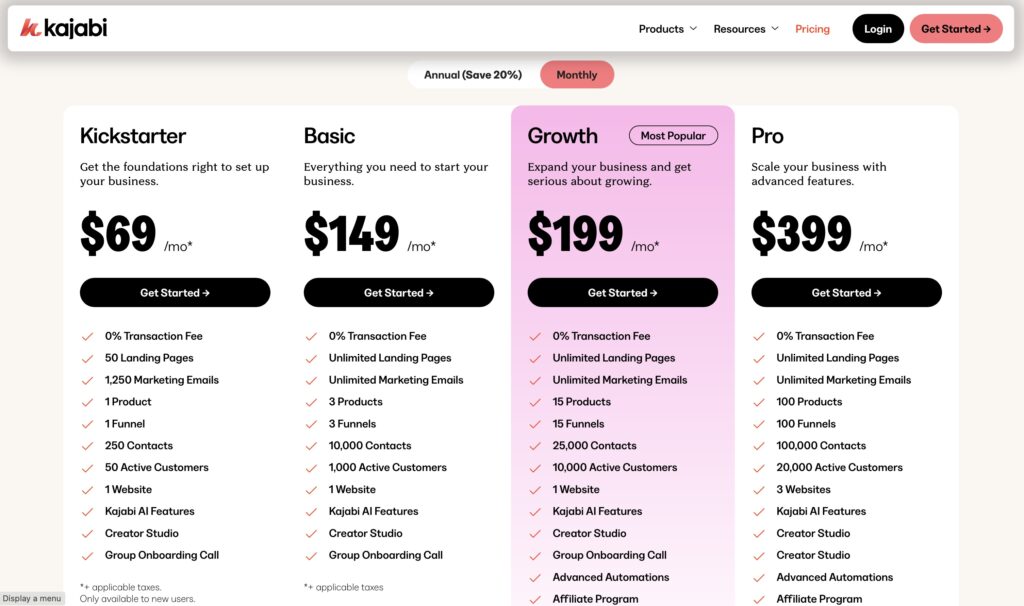
Weaknesses
- Cost Kajabi’s biggest downside is its price. The platform’s plans start at $149 per month and go up to $399 per month, which can be a significant investment for beginners or solo entrepreneurs. While it is marketed as an all-in-one solution, which means you may not need to pay for additional tools, the high price tag can still be prohibitive for those just starting out. Entrepreneurs on a tight budget may find it difficult to justify Kajabi’s cost when compared to more affordable solutions like Teachable or Thinkific, especially if they don’t need all of Kajabi’s advanced features right away.
- Learning Curve While Kajabi offers an all-in-one solution, the platform’s sheer range of tools and options can make it a bit overwhelming for newcomers. The learning curve can be steep, particularly for entrepreneurs who are not familiar with complex automation or marketing funnels. Setting up advanced automations and pipelines may take time and effort, and this can slow down the launch process for new businesses.
- Lacks Deep Customization Although Kajabi provides a variety of themes and templates, its customization options are somewhat limited when compared to platforms like WordPress or Scrile Meet. If you want to create a highly customized, unique look for your brand, Kajabi’s templates may feel restrictive. For businesses that want to stand out visually or have specific design requirements, this could be a significant drawback. While it does allow for some basic design adjustments, those with more complex customization needs may find Kajabi limiting.
- Not Course-Specific Kajabi is designed to serve multiple business types, including memberships, digital products, and coaching packages. While this is a strength in terms of versatility, it means that the platform doesn’t specialize solely in course creation like Teachable or Thinkific. For entrepreneurs focused specifically on delivering high-quality educational experiences, the platform may feel overly generalized, missing some advanced course-specific features like deeper quiz functions or intricate student progress tracking.
Opportunities for Improvement
- Lower Price Plans for Beginners Offering a more affordable entry-level plan could open the doors to a wider audience of entrepreneurs, particularly those who are just getting started. While Kajabi’s pricing is justified by its extensive features, not everyone needs all of them right away. A lower-tier plan for smaller businesses could provide a better pathway for users to grow with Kajabi over time.
- More Advanced Course Features Adding more educational tools for online courses, such as better quiz options, deeper learning management systems, or progress tracking, could help Kajabi compete with Teachable and Thinkific. While Kajabi excels at marketing and automation, its course creation features could be further refined for better educational experiences.
- Improved Customization For a platform that caters to growing businesses, more advanced customization optionswould be valuable. Allowing for deeper control over the platform’s design and user experience would make it more competitive with other all-in-one online coaching platforms like Scrile Meet, which already offers a higher degree of customization and flexibility.
Kajabi is a robust platform ideal for entrepreneurs who want an all-in-one solution to scale their coaching or online education business. Its automation tools, community-building features, and ability to handle multiple monetization strategies make it one of the most powerful platforms available today. However, its high price point and steep learning curve might deter beginners or those with more modest business goals. While Kajabi is a great fit for entrepreneurs ready to invest in scaling quickly, it may be overkill for coaches who are just getting started or who need more specialized course creation features.
For those seeking a more customizable, flexible solution, online coaching platforms like Scrile Meet can provide more tailored experiences, particularly for businesses that need video integration and a community-driven approach.
Thinkific
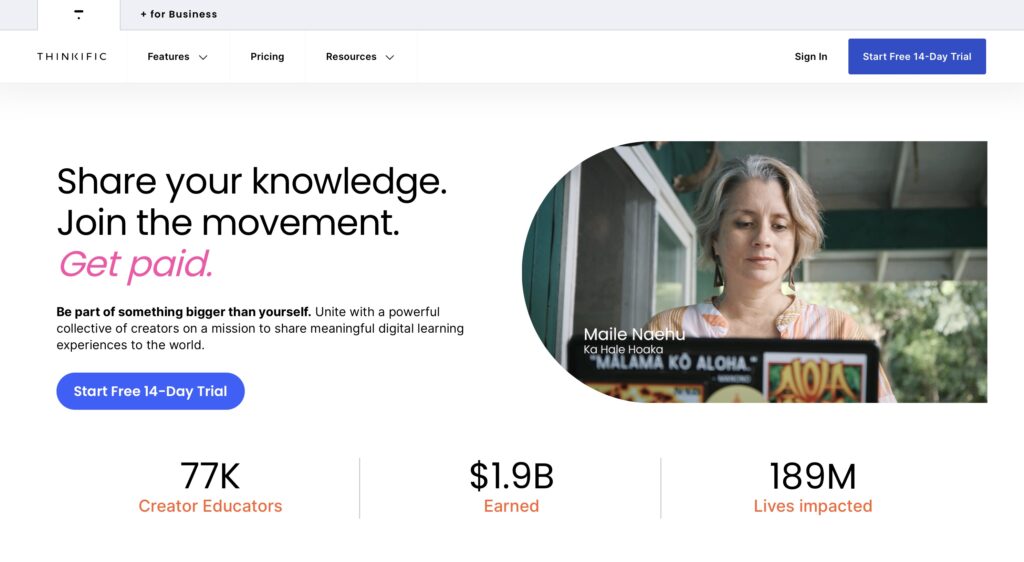
Thinkific is a widely-used platform that caters to course creators, particularly those focused on building educational content. It provides a versatile toolset for creating, marketing, and selling online courses with a strong emphasis on user experience and flexibility in course delivery. Here’s a deep dive into Thinkific’s strengths, weaknesses, and how it stacks up against competitors like Kajabi, Teachable, and Scrile Meet.
Strengths
- User-Friendly Course Creation Tools Thinkific shines when it comes to course creation and design. It provides an intuitive, drag-and-drop interface that allows users to build courses without needing any technical expertise. Course creators can easily upload video content, PDFs, quizzes, and assignments, making it a versatile choice for educators who want to deliver high-quality learning experiences.
What sets Thinkific apart is its support for multiple learning styles, allowing creators to use a variety of media types within a single course. This makes the platform highly adaptable for both text-based courses and more interactive, media-rich content like videos, live sessions, and group discussions. - Customization and Branding Options Thinkific offers strong branding and customization tools that allow course creators to build their own online learning websites. Unlike some other platforms that limit design options, Thinkific enables users to create fully branded experiences, making it easier to align the platform with the creator’s brand identity.
You can customize the look and feel of your course site, add custom domains, and tailor landing pages to match the branding of your business. This level of customization appeals particularly to entrepreneurs and small businesses who want to maintain consistency across all touchpoints of their brand. - Flexible Pricing Options One of Thinkific’s strong selling points is its flexibility in pricing models. The platform allows course creators to offer one-time purchases, subscriptions, or memberships. Users can also create bundled packages, providing students with access to multiple courses at a discounted price. This flexibility allows entrepreneurs to diversify their income streams and adapt to different customer preferences.
The ability to offer free courses also allows creators to use Thinkific as a lead-generation tool, capturing potential customers who may later purchase paid content. This feature is particularly valuable for coaches or educators looking to establish credibility and build their audience. - Seamless Integrations Thinkific offers a robust set of integrations that enhance its functionality, including tools for email marketing, analytics, and CRM systems. Popular integrations include Mailchimp, Zapier, and Shopify, which allow entrepreneurs to automate parts of their business, handle customer interactions, and track the success of their marketing campaigns.
While the platform provides basic marketing features like coupon codes and affiliate marketing, the seamless integration with external tools allows users to extend these functionalities even further. This gives course creators greater control over their marketing strategies without being locked into proprietary systems. - Student Engagement and Learning Management Thinkific provides several tools designed to improve student engagement and retention. Features like quizzes, assignments, and certifications help track student progress and ensure they remain engaged throughout the learning journey. Additionally, the platform offers drip scheduling, which allows course creators to release content over time. This ensures that students are not overwhelmed with information and can consume content at a pace that works best for them.
For businesses focused on delivering educational content, these features make Thinkific particularly appealing, as they enhance the overall learning experience.
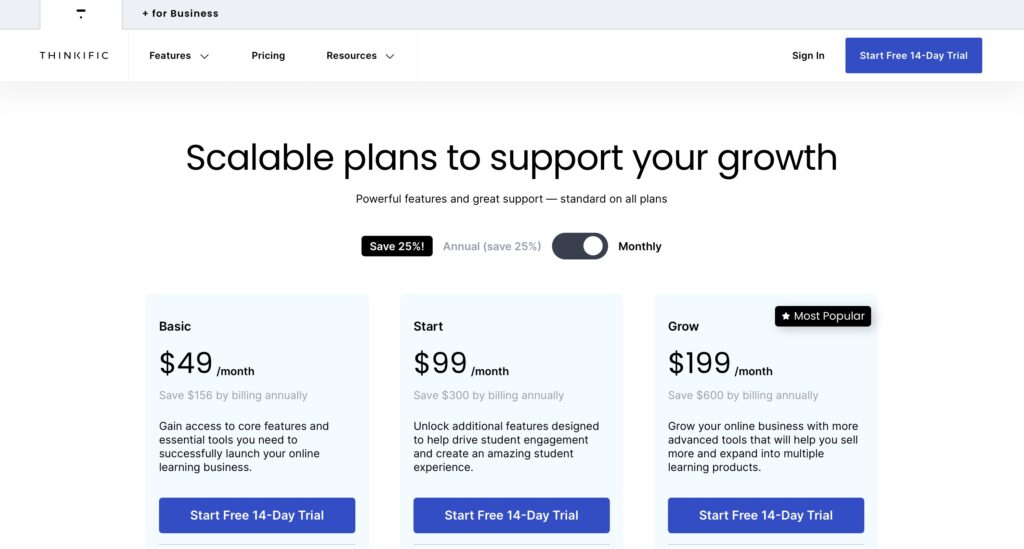
Weaknesses
- Limited Community-Building Tools One of Thinkific’s most notable weaknesses is its lack of community-building features. Unlike online coaching platforms like Mighty Networks or Kajabi, which prioritize community interaction as a key element, Thinkific focuses primarily on the course delivery aspect. This can be a drawback for entrepreneurs who want to foster stronger relationships with their students or clients through built-in community forums or social spaces.
While Thinkific does allow for student discussions through basic comment sections, it lacks the more dynamic community features found in other online coaching platforms. For coaches who rely on building a community around their brand, this could be a limitation. - Basic Marketing Features Although Thinkific offers basic marketing tools such as affiliate programs and coupon codes, its marketing functionality is not as advanced as competitors like Kajabi or Podia. The platform does not include built-in marketing automations, meaning that course creators must rely on third-party integrations (like Mailchimp or ActiveCampaign) to build effective sales funnels and automated email sequences.
For entrepreneurs looking for an all-in-one solution to handle both course creation and marketing, Thinkific’s reliance on integrations can feel fragmented compared to the seamless automation tools found in Kajabi. - Less Focus on High-End Coaching Features Thinkific is primarily geared towards educational courses, which means that its features for coaching businesses are somewhat limited. For coaches who want to incorporate live coaching sessions, group coaching, or one-on-one video calls, Thinkific’s native tools may not be sufficient. The platform focuses heavily on pre-recorded, structured learning rather than dynamic, real-time interactions, which could be a disadvantage for businesses looking to offer high-touch, personalized coaching.
Competitors like Scrile Meet, which offers live video conferencing and one-on-one interaction features, may be a better fit for businesses heavily focused on coaching.
Opportunities for Improvement
- Enhanced Community Features Introducing more robust community features would greatly benefit Thinkific, allowing creators to foster engagement between students. Adding features like live chat rooms, discussion forums, and student groups could transform Thinkific from a purely educational platform into a comprehensive community-driven coaching and learning platform.
- Built-in Marketing Automations Thinkific could strengthen its appeal by offering more advanced marketing automation tools directly within the platform. While third-party integrations provide some level of automation, having a built-in system would simplify the marketing process for entrepreneurs, helping them save time and effort in managing their business.
- Live Coaching and Advanced Communication Tools Adding more robust live video features, particularly for one-on-one coaching or group coaching, could open up new opportunities for Thinkific. Expanding its real-time engagement tools would allow it to cater better to coaches, especially those who rely on personalized interaction with clients. For example, the platform could integrate live scheduling tools, video conferencing, and private coaching spaces to enhance the coach-client relationship.
Best for Course Creators, but with Gaps for Coaches
Thinkific excels as a course creation platform, offering a comprehensive toolset for building, delivering, and selling online courses. Its strengths lie in its customization options, flexible pricing models, and student engagement tools, making it a great choice for entrepreneurs and educators focused on providing structured, content-rich learning experiences.
However, the platform has clear gaps in terms of community-building and live coaching features, which limits its appeal to coaches who need real-time interaction with clients. Additionally, the lack of built-in marketing automationsmakes Thinkific less convenient for those who want an all-in-one solution for both course creation and marketing.
Entrepreneurs who prioritize community interaction or require dynamic live coaching tools might find online coaching platforms like Scrile Meet or Kajabi to be more fitting solutions. However, for creators whose primary focus is delivering educational content with flexible pricing options, Thinkific remains a top contender.
Podia
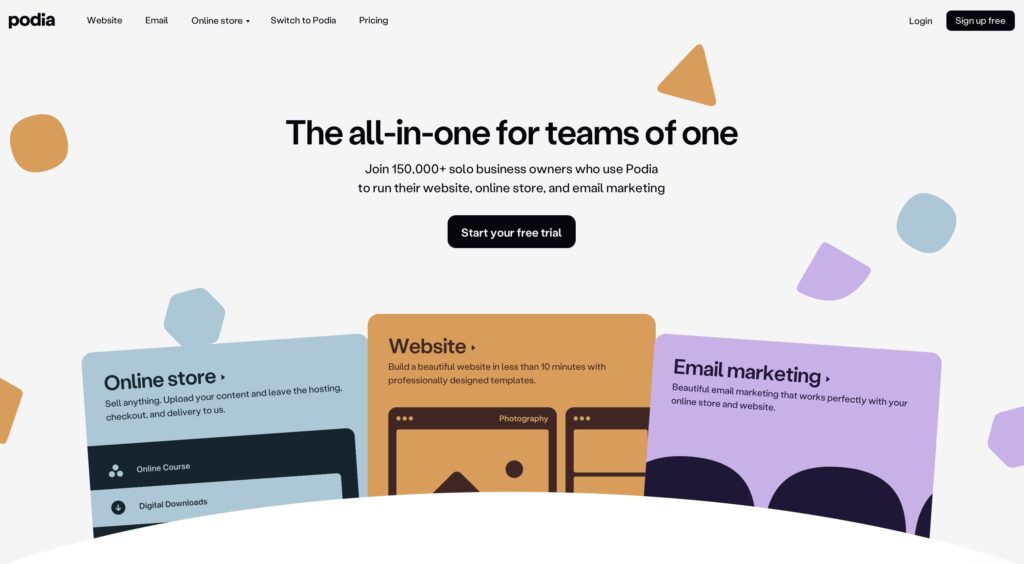
Podia is a versatile, all-in-one platform designed to help creators and entrepreneurs sell online courses, memberships, and digital products. It appeals to a broad audience, from educators to influencers and small business owners, thanks to its simplicity and focus on offering everything needed in one place. Here’s an in-depth analysis of Podia’s strengths, limitations, and how it compares with other online coaching platforms like Thinkific, Teachable, and Kajabi, as well as how it stands as a competitor to Scrile Meet.
Strengths
- Simplicity and User-Friendliness One of Podia’s greatest strengths is its intuitive design and ease of use. It’s built with non-technical users in mind, which makes it extremely user-friendly for anyone, from seasoned entrepreneurs to beginners who want to quickly set up a digital storefront. The platform requires little to no coding or technical knowledge, enabling users to create and sell courses, digital products, and memberships in a matter of hours.
Podia’s dashboard is straightforward, with clean navigation that helps users manage everything from content creation to sales and marketing. It doesn’t overwhelm with unnecessary complexity, which is why many entrepreneurs prefer Podia for its streamlined approach to building online businesses. - Memberships and Community Building A standout feature of Podia is its membership functionality. Unlike many online coaching platforms that focus solely on course creation, Podia provides robust tools to build a subscription-based membership community. This allows creators to offer exclusive content, private groups, and ongoing support to their members, giving them a way to monetize beyond traditional course sales.
This makes Podia highly appealing for coaches, influencers, and entrepreneurs who want to build a recurring revenue stream through memberships. It’s a key selling point for creators who value community engagement and want to provide continuous value to their audience. - All-in-One Platform Podia offers a fully integrated solution for selling not just courses, but also digital downloads (such as ebooks, templates, etc.) and webinars. This makes it an attractive option for creators who offer multiple types of content, as they don’t need to rely on several different platforms to sell products and manage their business. Podia also includes email marketing and affiliate management built into the platform, further reinforcing its all-in-one functionality.
While many competitors require external integrations for these functions, Podia’s unified platform simplifies the process and reduces the reliance on third-party tools. For those who want one platform to handle everything from content creation to sales, Podia offers significant value. - Transparent Pricing Podia’s pricing structure is refreshingly transparent. It offers a flat monthly fee, with no transaction fees on sales made through the platform. This is particularly appealing for entrepreneurs who want to keep costs predictable and avoid paying a percentage of every sale, as is the case with some other online coaching platforms.
With pricing tiers starting at $39 per month and going up to $89 per month, Podia is relatively affordable, especially when considering its range of features. For those looking for a cost-effective solution without hidden fees, this pricing structure is highly competitive. - Webinars and Live Streaming Podia stands out by offering built-in webinars and live streaming options. This feature allows creators to host live sessions, workshops, or coaching events directly on the platform, without needing to use third-party services like Zoom or YouTube. The ability to run live events seamlessly within Podia adds value, especially for coaches or instructors who want to provide interactive, real-time experiences to their audience.
Additionally, Podia offers the ability to sell access to these live webinars, adding another potential revenue stream for creators. This makes it particularly useful for entrepreneurs who want to mix both live and pre-recorded content as part of their offerings.
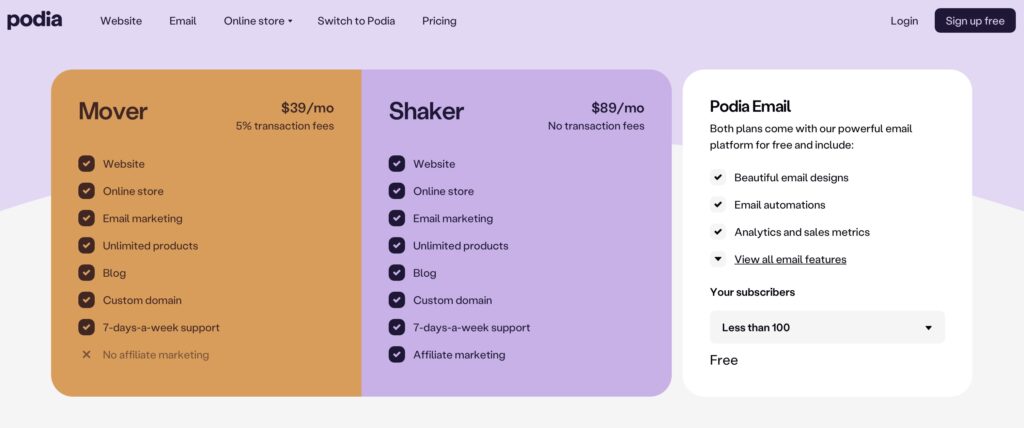
Weaknesses
- Limited Customization Options While Podia excels in simplicity, it lacks some of the advanced customizationfeatures found in competitors like Kajabi or Thinkific. Users can create branded course sites and landing pages, but the level of design flexibility is limited compared to other online coaching platforms that offer more control over site aesthetics.
This could be a drawback for entrepreneurs who want to fully customize the look and feel of their platform to stand out from the competition. While Podia allows for basic branding, those who require intricate design changes or unique user interfaces might find it restrictive. - Basic Analytics Podia offers basic analytics on course performance, sales, and email marketing, but it lacks the detailed reporting and in-depth metrics that many entrepreneurs rely on to make data-driven decisions. For instance, it doesn’t offer robust A/B testing capabilities or advanced sales funnel tracking, which are common features in more high-end platforms like Kajabi.
Entrepreneurs who want detailed insights into their audience’s behavior or to track conversion rates on different offers might find Podia’s analytics somewhat lacking. For those who rely heavily on data to optimize their business, the platform may feel insufficient in this area. - Limited Course Structure Flexibility Podia is fantastic for creators who want to sell straightforward courses, but for those who need more complex course structures—such as prerequisites, advanced drip content, or certification options—it may feel too simplistic. online coaching platforms like Thinkific or Teachable offer more advanced course-building tools that cater to educators or businesses who deliver complex educational programs.
While Podia supports the essentials (video, audio, downloads), it lacks the detailed control over how courses are structured or delivered over time that some educators might need. For large-scale courses with intricate requirements, Podia might not be the best fit.
Opportunities for Improvement
- Enhanced Customization While Podia’s simplicity is a selling point, offering more customization options could attract users who want greater control over their branding and user experience. Even introducing a set of advanced design tools for higher-tier users could bridge the gap between simplicity and the need for more flexibility.
- Improved Analytics and Reporting Podia could significantly enhance its value by offering more robust analyticsand reporting features. Expanding its dashboard to include detailed sales funnels, conversion tracking, and user behavior would allow entrepreneurs to make more data-informed decisions, which is crucial for optimizing their business strategies.
- Advanced Learning Features Adding more advanced learning features, such as certification programs, quizzes, and more complex drip content scheduling, would make Podia more competitive in the educational space. It could cater to users who need more intricate course structures, without sacrificing its trademark simplicity.
Podia’s strength lies in its simplicity, affordability, and all-in-one nature that makes it easy for creators to get up and running. The platform excels at offering a range of monetization options—whether through courses, digital products, or memberships. For entrepreneurs who want a straightforward platform without the need for intricate design or complex course structures, Podia offers great value.
However, it does have some clear limitations in terms of customization, analytics, and advanced learning features. For those looking for a more complex educational experience or more robust marketing and sales funnels, online coaching platforms like Kajabi or Thinkific may be better options.
Podia remains a solid choice for creators who value ease of use and want a low-maintenance solution to sell their knowledge and content online.
Top 5 online coaching platforms
Here’s a deeper analysis comparison table for the top 5 online coaching platforms, breaking down their features, strengths, weaknesses, and best use cases. This table is more detailed and highlights key factors relevant to entrepreneurs and content creators:
| Feature/Criteria | Mighty Networks | Teachable | Kajabi | Thinkific | Podia |
| Best For | Community-building and engagement | Course creation and educational focus | All-in-one platform for scaling | Course creation with customization | Simplicity and all-in-one platform |
| Target Audience | Coaches with a community focus | Educators, beginner course creators | Coaches ready to scale, marketers | Educators and professional course creators | Coaches looking for simplicity in setup |
| Strengths | Community-first approach, flexible offerings | User-friendly, great for beginners | Powerful automation tools, excellent for scaling | Highly flexible, great integrations | User-friendly, webinars, all-in-one simplicity |
| Customization | Basic customization, limited video tools | Limited course design flexibility | High customization for automation and marketing | Strong course flexibility, good for integrations | Simple customization, lacks advanced options |
| Video Tools | Limited video integration options | Basic video hosting | Robust, but expensive | Basic, primarily focused on course content | Webinars and video hosting available |
| Community Features | Strong community-building options | Lacks strong community tools | Weak community tools | Basic community-building tools | Basic community features |
| Monetization | Memberships, courses, subscriptions | Course sales, memberships | Upselling, memberships, bundled services | Course sales, memberships | Webinars, memberships, digital product sales |
| Live Coaching Tools | Lacks live coaching tools | Lacks live video tools | Built-in live coaching options | Lacks integrated live coaching | Built-in live webinars, basic live tools |
| Scalability | Moderate scalability, great for niche communities | Limited scalability | Highly scalable with automation | Scalable, but limited in community aspects | Scalable, but limited to smaller businesses |
| Marketing Tools | Basic marketing tools, community-driven | Limited marketing capabilities | Powerful marketing automation | Good marketing tools, basic automation | Good marketing tools, but less advanced |
| Pricing | $33/month | Starts at $39/month | Starts at $149/month | Free plan available, paid from $36/month | Starts at $39/month |
| Pros | Community-driven, easy to monetize | User-friendly, great for beginners | Strong automation, ideal for scaling | Flexible course design, strong integrations | Simple setup, webinars included, affordable |
| Cons | Limited video tools, customization | Limited advanced features | High cost, lacks strong community focus | Lacks live coaching tools, basic community features | Limited customization, basic analytics |
| Unique Value | Best for building niche communities | Great for entry-level course creators | Comprehensive marketing and sales automation | Good for flexible course creation and professional educators | Simple all-in-one solution, best for small creators |
Detailed Summary:
- Mighty Networks: If your primary focus is on building a community around your coaching or content, Mighty Networks excels with its niche-driven approach. However, its lack of customization for video content limits more interactive coaching possibilities. Monetization through memberships and courses works seamlessly.
- Teachable: This platform is the go-to for beginners due to its simplicity. It allows for easy course creation but lacks more advanced community-building or marketing tools, which might limit its potential for more ambitious entrepreneurs.
- Kajabi: Ideal for serious entrepreneurs looking to scale. Kajabi offers powerful automation and upselling tools, making it a robust platform for those ready to invest in growing their business. However, it’s expensive and does not emphasize community engagement, which could be a drawback for coaches looking for a more interactive model.
- Thinkific: Best suited for educators who need flexibility in course design and advanced integrations. While Thinkific is excellent for course creation, its community-building and live coaching features are basic, which could limit its appeal to coaches who rely on real-time interaction.
- Podia: Perfect for entrepreneurs who want simplicity in their platform. Podia covers everything from webinars to memberships and digital product sales with a flat pricing model. Its simplicity, however, comes at the cost of limited customization and analytics for advanced users.
This table and analysis should give entrepreneurs and online coaches a clearer idea of which platform might best fit their business model, depending on their priorities—whether that’s community engagement, ease of use, or scalability.
What Makes a Better Online Coaching Platform?
The platforms we just reviewed have a lot going for them, but none of them are perfect. For entrepreneurs or coaches aiming to create the ultimate online coaching platform, it’s crucial to understand where these online coaching platforms fall short—and how you can build something even better.
One of the biggest gaps across most online coaching platforms is customization. Many coaching platforms limit how much you can control the design and functionality of your space. You can change colors and logos, sure, but deeper customization—like adjusting the user experience, tailoring specific tools, or embedding unique content formats—is often restricted. This is frustrating for coaches who want their platform to reflect their brand fully or adapt to their evolving needs.
Another key shortcoming is the lack of advanced live video tools. Live video has become essential for coaching, especially in one-on-one or group sessions. Platforms like Mighty Networks and Kajabi offer some live tools, but they are often not as interactive or customizable as coaches need. This can leave coaches relying on third-party services like Zoom or YouTube, which adds complexity and a disjointed experience for clients.
Community-building is another area where some online coaching platforms, especially those focused on courses, tend to struggle. While Mighty Networks excels in this area, others like Teachable and Thinkific focus more on the course delivery side. But for many coaches, fostering a strong, engaged community is just as important as offering great content. A platform that integrates both seamlessly could significantly enhance the coaching experience and create more loyal clients.
Lastly, scalability and pricing are big factors for entrepreneurs. Some online coaching platforms, like Kajabi, are great for scaling but are costly for beginners. On the other hand, simpler platforms like Podia might lack the depth needed for long-term growth. The ideal platform would offer flexible pricing plans that grow alongside the business, offering advanced features only when they’re needed.
So, what makes a better online coaching platform? Flexibility, customization, powerful video tools, community-building features, and scalability—all at an accessible price point. These are the key areas where the next big coaching platform could stand out. And that’s where Scrile Meet comes in.
How Scrile Meet Can Help You Build the Best Platform
Now that we’ve explored the strengths and weaknesses of the top online coaching platforms, let’s talk about what it takes to build something even better. If you’re an entrepreneur looking to create your own platform—or if you’re a coach who’s outgrown the limitations of existing tools—Scrile Meet offers an ideal solution.
At its core, Scrile Meet is a highly customizable platform designed for coaches who need more than the basics. Unlike other online coaching platforms, Scrile Meet offers advanced video conferencing tools that go beyond standard live streaming. You can run interactive one-on-one sessions, host group coaching calls, or offer live classes, all while maintaining control over the user experience. This level of flexibility is crucial for building a brand that stands out in the crowded online coaching space.

Customization is where Scrile Meet truly shines. Many online coaching platforms offer fixed templates, but Scrile Meet allows you to tailor every aspect of your platform to your specific needs. Whether it’s integrating unique tools for client interaction, designing custom workflows, or creating a branded environment, you have the control to build a platform that fits your vision. And as your business grows, Scrile Meet grows with you—whether you’re offering paid courses, subscription services, or live coaching packages.
Another critical advantage of Scrile Meet is its focus on community-building. Unlike platforms that separate community features from course creation, Scrile Meet blends them seamlessly. You can nurture an engaged audience by offering both high-quality content and interactive community spaces, keeping clients invested in your platform. This creates stronger, long-term relationships with clients—ultimately boosting both client retention and revenue.
Lastly, Scrile Meet is designed with scalability in mind. As you expand your coaching business, you’ll need a platform that can handle more clients, more features, and more revenue without breaking the bank. Scrile Meet’s pricing plans are structured to grow with your business, offering flexibility and scalability without the steep costs associated with online coaching platforms like Kajabi.
If you’re ready to take control and build the best platform for online coaching, Scrile Meet gives you the tools to make it happen. From video conferencing to community management, customization to scalability, Scrile Meet lets you create something truly unique—something that meets the needs of your audience and grows with your business.
Seize the Opportunity
Choosing the right platform is essential for any online coach who wants to succeed in today’s competitive market. The best online coaching platforms can help you deliver high-quality content, build a strong community, and scale your business efficiently. However, as we’ve seen, even the best online coaching platforms come with limitations—whether it’s the lack of deep customization, advanced video tools, or affordable scalability.
This is where Scrile Meet comes into play. By offering flexibility, customization, and seamless integration of live video coaching with community-building tools, Scrile Meet empowers entrepreneurs and coaches to create a truly unique coaching platform. Whether you’re an online creator, adult content coach, or an entrepreneur looking to scale a coaching business, Scrile Meet provides the tools to build something better, without the compromises of other platforms.
Don’t just settle for what’s available. Create a coaching platform that works for you and your audience, and make the most of this booming industry. Explore Scrile Meet today, and start building a platform that stands out from the rest.
Build you own coaching platform
Now you know pretty much about competition and that is a first step to start your own business! Ready to build the best platform for online coaching? Learn more about Scrile Meet and take control of your coaching business today!
Read Also
Consultation Marketplace Development – Learn how to create a platform that connects clients with experts.
Virtual Mastermind Group – Build high-value group coaching sessions and peer accountability networks.
Community Platform – Set up an engaging, private community hub for your brand or business.






I’ve been using Teachable for a while but thinking of switching to Scrile Meet for more customization. This article helped clarify the differences.
Great roundup! I didn’t know Podia had built-in webinars. That’s a huge plus for my coaching model
I wish more platforms offered built-in community tools like Mighty Networks. Scrile Meet seems like it combines that with better video features.
Kajabi sounds powerful but too expensive for small creators like me. Might give Scrile Meet a try instead.
Appreciate the deep dive into Thinkific. I’ve struggled with the lack of live video tools there.
This comparison is gold. Finally a post that breaks down the pros and cons without just promoting one platform.
Really love how Scrile Meet blends community, live video, and customization. That’s rare!
Glad to see someone mention how steep Kajabi’s learning curve is. Not enough people talk about that.
Podia has always felt limiting to me—good to see alternatives like Scrile Meet stepping in with more features
Now I finally understand why everyone’s switching from Teachable to Scrile Meet. Thanks for the detailed insights!